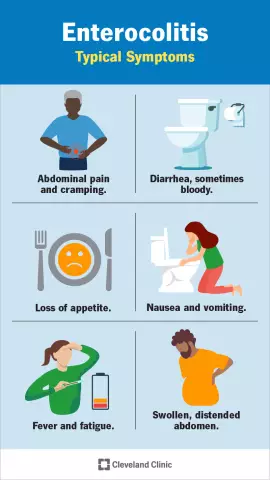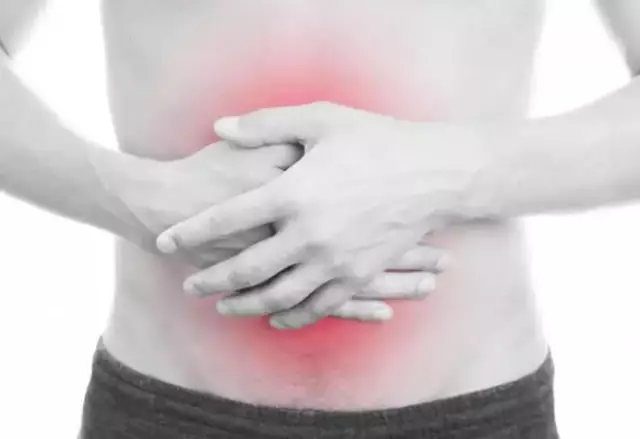- Author Rachel Wainwright wainwright@abchealthonline.com.
- Public 2023-12-15 07:39.
- Last modified 2025-11-02 20:14.
Peritonitis
Peritonitis is an inflammation of the peritoneum. This condition is extremely dangerous for the body, as it disrupts the functioning of all vital organs. Acute peritonitis requires urgent medical attention, otherwise it can be fatal in a short time.
Causes of peritonitis

Peritonitis is caused by an infection or foreign substance (pancreatic enzymes, bile, etc.) that has entered the abdominal cavity. The main reason why the infection penetrates the peritoneum is purulent fusion of the abdominal organ, trauma to the hollow organs of the abdominal cavity, trauma, including the operating room, in the area of the abdominal organs.
The most common infectious agents causing peritonitis are streptococci, staphylococci, Pseudomonas aeruginosa, Escherichia coli, gonococci, pneumococci, mycobacterium tuberculosis, as well as anaerobic microorganisms.
The main cause of infectious peritonitis is acute purulent appendicitis, somewhat less often perforation of stomach and duodenal ulcers, acute purulent cholecystitis, acute pancreatitis, acute purulent inflammation of the pelvic organs, ruptures of the stomach, intestines, bladder as a result of wounds or advanced tumor process.
Types of peritonitis
Peritonitis is primary and secondary.
Primary, it is also idiopathic or viral peritonitis, occurs extremely rarely, as a result of a primary infection of the abdominal cavity and peritoneum. In the case of viral peritonitis, the infection enters the peritoneum by the hematogenous route, or through the lymphatic vessels, occasionally through the fallopian tubes. Viral peritonitis accounts for no more than 1% of all cases of the disease.
Depending on the reason, there are:
- Infectious peritonitis;
- Perforated peritonitis;
- Traumatic peritonitis:
- Postoperative peritonitis.
By the nature of the inflammatory exudate:
- Serous peritonitis;
- Purulent peritonitis;
- Hemorrhagic peritonitis;
- Fibrinous peritonitis;
- Gangrenous peritonitis.
By the degree of distribution:
- Local peritonitis;
- Widespread peritonitis;
- General (total) peritonitis.
By localization:
- Delimited (encapsulated) peritonitis;
- Spilled peritonitis.

By traumatic factor:
- Bacterial, it is also microbial or infectious peritonitis. It is divided, in turn, into non-specific, caused by pathogens that have come from the gastrointestinal tract, and specific, caused by other pathogens;
- Aseptic peritonitis, the damaging factor is not infection, but the toxic effects of any substance. This can be the ingress of gastric juice, pancreatic enzymes, blood, bile, etc.
- Special peritonitis (carcinomatous, parasitic, rheumatoid, granulomatous).
Peritonitis symptoms
Acute peritonitis has several phases of development:
- The reactive phase lasts 12 to 24 hours;
- Toxic phase, duration from 12 to 72 hours;
- The terminal phase occurs after an interval of 24 to 72 hours from the onset of the disease and lasts several hours.
Thus, acute peritonitis can be fatal within 24 hours of onset.
Symptoms of peritonitis in the initial, reactive phase initially coincide with the symptoms of the underlying disease, which become sharper and brighter. Usually, the onset of acute peritonitis is evidenced by increased pain spreading to the entire abdomen, the peak of pain is noted in the area of the primary focus. The abdomen becomes tense, board-like. The symptoms of peritoneal irritation are sharply positive, the most famous of which is the Shchetkin-Blumberg symptom: on palpation of the abdomen, with a quick withdrawal of the hands, a sharp soreness occurs. The patient tries to lie on his side with the legs brought to the stomach ("fetal position"), any attempt to change the position increases the pain. The speech is quiet, the moans are weak. The body temperature is elevated.
Symptoms of peritonitis in the toxic stage can be misleading in that there is an apparent improvement. The pain subsides, the abdomen ceases to be tense, the patient enters a state of lethargy or euphoria. His facial features are sharpened, pallor appears, nausea and vomiting are possible. Sometimes vomiting takes on a painful, debilitating character. Decreases urination and intestinal motility, and even when listening to the usual intestinal noises are not heard (a symptom of "deathly silence"). The mucous membranes in the mouth are dry, but fluid intake is difficult due to lethargy or vomiting. About 20% of patients die at this stage.
Symptoms of peritonitis in the terminal stage indicate a profound disorder in the function of all body systems and the onset of a phase of decompensation, when the body's defenses are depleted. The patient is in prostration, indifferent to what is happening, sometimes at this stage there is an intoxication disorder of the psyche. The face takes on an earthy hue, the eyes and cheeks sink (the so-called "Hippocratic mask"), cold sweat appears. Abundant vomiting of putrid contents of the small intestine is possible. Shortness of breath and tachycardia develop, body temperature, previously high, falls. The abdomen is distended, painful, but there is no protective muscle tension. The Shchetkin-Blumberg symptom becomes mild. At this stage, about 90% of patients die.
Diagnosis of peritonitis
Diagnosis is based on the characteristic symptoms of peritonitis and blood tests. In the blood test, a purulent-toxic shift in the leukocyte formula is observed. X-ray diagnostics and ultrasound examination of the abdominal organs are used, and in doubtful cases - laparoscopy.
I must say that the diagnosis of peritonitis should be as urgent as possible, since the condition requires urgent treatment.
Peritonitis treatment
Peritonitis is treated in the Department of Emergency Surgery. If acute peritonitis is suspected, food, water and pain relievers should not be taken, heating pads and enemas should not be used, the patient should remain supine. The basis of the treatment of peritonitis, with the exception of rare cases (delimited peritonitis, a state of agony, etc.), is a surgical operation.

Before the operation, preparations are carried out aimed at at least partial stabilization of the patient's condition. Preparation consists of replenishing the fluid balance, relieving pain shock and normalizing blood pressure.
Surgical intervention for the treatment of peritonitis is performed under general anesthesia. During the operation, the primary infectious focus is eliminated, the inflammatory effusion is removed, the abdominal cavity is washed with antiseptics and drains are installed. Then, the intestinal obstruction, which has developed as a result of sepsis, is restored, and intestinal compression is eliminated. After the operation, it is the turn of the drug treatment of peritonitis, for which active antibiotic therapy is used, as well as therapy aimed at maintaining the vital functions of the body.
YouTube video related to the article:
The information is generalized and provided for informational purposes only. At the first sign of illness, see your doctor. Self-medication is hazardous to health!






